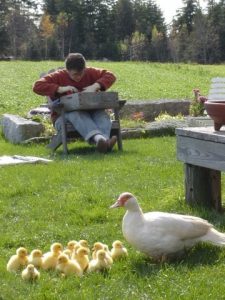Farm Scoop – September 2014
2014 Cornell Sheep & Goat Symposium
Electronic registration and payment via credit card for the 2014 Cornell Sheep & Goat Symposium is now available. You may register up to 2 people online from the same farm and pay with a credit card. If you wish to register more people, please register by mail and send a check made out to Cornell University. Online registration is only available to those attending the Saturday Symposium. If you are not attending on Saturday but wish to register only for the Friday Hands-on activities, please register by mail and send a check made out to Cornell University. Registration deadline is September 24, 2014.
The 2014 Cornell Sheep & Goat Symposium will be held on Friday and Saturday 3 and 4 October. The hands-on activities Friday will start with a tour of the Cornell Sheep Farm and explanation of ongoing research and management. The Saturday sessions will be in Morrison Hall on the Cornell Campus, Ithaca, NY. Dr. Dave Thomas from the University of Wisconsin, Madison will give the opening talk on sheep dairying in North America. He will also give a later talk on dairy sheep research at the Univ. of Wisconsin. Other topics include
- Creating a Fibershed for New York – Helen Trejo, Graduate Student, Cornell Apparel & Design
- Integrative Parasite Management – Katherine Petersson, Associate Professor, University of Rhode Island; Anne Zajac, D.V.M., Virginia/Maryland Regional College of Veterinary Medicine at Virginia Tech; Dwight Bowman, Professor, Cornell University; Jan Liotta, Cornell University; Tatiana Stanton and Mike Thonney, Cornell University
- Expanding your grazing capacity – Don Wild, Wild Acres Family Farm/King’s AgriSeeds, past NRCS grazing specialist and Ben Wood, Pinecroft Farms LLC.
- Setting up a herd or flock management program and how your veterinarian can help – Professor Mary Smith, D.V.M., Cornell University.
- Control of coyote depredation in NY – Martin Lowney, USDA APHIS Wildlife Services.
- Keys to successful goat dairy management – René DeLeeuw, Farm Manager, Ayers Brook Goat Dairy, Vermont Creamery Demonstration Dairy.
- Genotypes of Cornell Dorset and Finnsheep compared with commercial Romneys for the ability to lamb out of season – Christian Posbergh, Undergraduate Honors Student, Cornell University.
- Managing pastures for organic goat & sheep production – Jim Kotcon, Associate Professor, West Virginia University.
- Biology of maternal behavior at lambing time – Natasha Pettifor, PhD Candidate, Cornell University.
Mainers Urged to Sign Up for Free Disposal of Banned, Unusable Pesticides
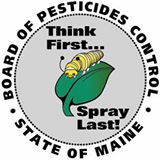 This October, the Maine Department of Agriculture, Conservation and Forestry’s (DACF) Board of Pesticides Control (BPC) will team up with the Maine Department of Environmental Protection (DEP) to help Mainers dispose of banned or unusable pesticides.
This October, the Maine Department of Agriculture, Conservation and Forestry’s (DACF) Board of Pesticides Control (BPC) will team up with the Maine Department of Environmental Protection (DEP) to help Mainers dispose of banned or unusable pesticides.
This free disposal program is open to homeowners, family-owned farms and greenhouses. Collection will occur at sites located in Presque Isle, Bangor, Augusta and Portland. To qualify, people must register by September 26, 2014.
Governor Paul R. LePage is urging Mainers to take advantage of this opportunity to protect the environment and save money through this once a year collection event that highlights cooperation between government agencies. “This is an opportunity for Mainers to dispose of unusable pesticides properly and at no expense,” said Governor LePage. “By consolidating collections into four central locations and using in-house resources and expertise, we can reduce disposal costs to about $2 per pound. That’s a great value for Maine taxpayers.”
It’s not unusual for homes and farms to have unintentional hazardous waste—banned pesticides or pesticides that have become caked, frozen, or otherwise rendered unusable—sitting around in basements, garages, or barns. These chemicals can be difficult and expensive to dispose of; DACF Commissioner Walt Whitcomb stressed the importance of proper disposal of banned or unwanted pesticides.
“It’s important for the protection of public, wildlife, and environmental health that these products are dealt with properly and not thrown in the trash or down the drain, where they can contaminate land and water resources, including drinking water,” said Commissioner Whitcomb. “People holding these chemicals should contact the BPC as soon as possible to register for the October collection.”
“Providing an easy and no cost solution for Mainers to properly dispose of pesticides is a win for the environment and public health,” said Maine DEP Commissioner Patricia Aho. “The collection events cover the State and are held in Presque Isle, Bangor, Augusta and Portland providing accessible methods of collection and future disposal.”
The collected chemicals go to out-of-state disposal facilities licensed by the federal Environmental Protection Agency where they are incinerated or reprocessed.
Registration by September 26, 2014, is mandatory—drop-ins are not permitted. To register, get details, and learn important information about the temporary storage and transportation of obsolete pesticides, go to the BPC website at thinkfirstspraylast.org, or call 207.287.2731.
The Maine Obsolete Pesticides Collection Program, jointly sponsored by the BPC and DEP, and paid for entirely through pesticide product registration fees, has kept more than 90 tons of pesticides out of the waste stream since its start in 1982.
- For more information on the Maine Board of Pesticides Control, go to: thinkfirstspraylast.org.
- For more information on the Maine Department of Environmental Protection, go to: maine.gov/dep.
Agricultural Producers in Maine Still Have Time to Apply for Low-Interest Loans
The U.S. Department of Agriculture (USDA) Maine Farm Service Agency (FSA) Executive Director, Don Todd, announced that farmers and ranchers still have time to apply for low interest 2014 loans available through FSA’s direct farm ownership program. The deadline to submit applications is Sept. 30, 2014.
Eligible producers can borrow up to $300,000 in direct farm ownership loans to buy or enlarge a farm, construct new farm buildings or improve structures, pay closing costs, or promote soil and water conservation and protection. The interest rate on select loans can be as low as 1.5 percent with up to 40 years to repay.
“This is an extraordinary opportunity for more farmers and ranchers to get low-interest loans to start their first farm, or expand an existing family farm,” said Todd. “There are no backlogs or waiting for funding. If you’ve dreamed about starting a farm, or if you’re looking to strengthen your farm, we want to help.”
FSA encourages all interested applicants to apply for direct farm ownership loans. For more information about the program and other loans administered by FSA, visit any FSA county office or www.fsa.usda.gov.
Assessing Your Farm Business Plan
Assessing Your Farm Business Plan (click on the ‘get tool’ link under the headline) is an interactive assessment to assist farmers and agri-entrepreneurs in evaluating the potential of their farm business planning success. There are 54 statements in the assessment to which you rate your degree of agreement. This tool provides you with the opportunity to assess the components of your plan and make revisions before investing your valuable time and resources in the new business.
The University of Maryland Extension home page has a lot of interesting and useful business planning resources and learning modules.
FairRent for the Web – Now Available
Cash rent negotiations will be very challenging this year. At current commodity prices it is going to be important for producers to know their costs and look at options to limit downside risk. The Center for Farm Financial Management, University of Minnesota has just released a tool to help producers and landlords evaluate alternative rental arrangements. FairRent for the Web is a new and improved web version of the desktop software that CFFM has distributed for over 20 years.
The web version of FairRent includes the option to evaluate seven different flex lease options as well as traditional cash rent and share rental returns. Another improvement is the inclusion of crop insurance to evaluate how insurance will limit downside risk.
FairRent is free to use. Just sign up and begin creating rental plans.
Upcoming 2014-2015 Beekeeping Courses
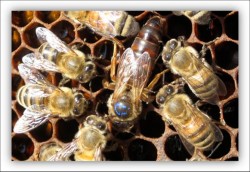 Would you like to learn how to produce your own local honey, and help provide pollinators for your yard, farm or neighborhood? Don’t miss the opportunity to take beekeeping classes from the UMaine Extension and the Maine State Beekeepers Association.
Would you like to learn how to produce your own local honey, and help provide pollinators for your yard, farm or neighborhood? Don’t miss the opportunity to take beekeeping classes from the UMaine Extension and the Maine State Beekeepers Association.
There are three upcoming Beginner Beekeeping courses, that are great opportunities for new beekeepers, prior to their first year of bees, or it can be a great refresher course for beekeepers just now going into their first winter.
Additionally there is an Intermediate Beekeeping course available that is geared towards beekeepers with two plus years of experience. The focus of this class is how to effectively manage an apiary under Maine conditions. It will include how to keep your colonies healthy and thriving, and how to meet the goals you have with your bees such as swarm prevention, honey production, and colony maximization.
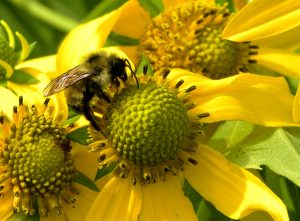 2014 Fall: Beginner Beekeeping — Cumberland County
2014 Fall: Beginner Beekeeping — Cumberland County
Dates: Thursdays, October 16 to November 13
Time: 6:30 PM – 8:30 PM
Location: UMaine Extension Cumberland Office, 75 Clearwater Drive, Falmouth, ME
Workshop Fee: $100.00 per person
Instructors: Jack Hildreth and Chris Rogers
2014 Fall: Beginner Bee School – York County
Dates: Wednesdays, October 1 to October 29
Time: 6:00 PM – 8:30 PM
Location: UMaine Extension York County office, 21 Bradeen St., Springvale, ME
Workshop Fee: $90.00 per person; $130 for two sharing texts
Instructor: Larry Peiffer
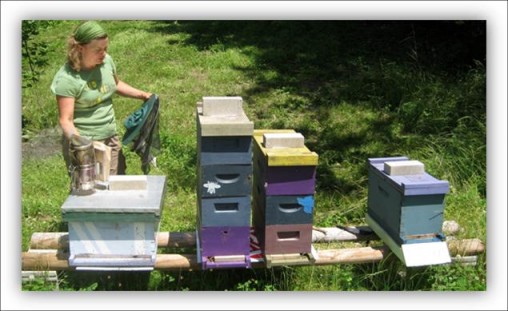 2015 Winter: Beginner Beekeeping – Cumberland County
2015 Winter: Beginner Beekeeping – Cumberland County
Dates: Thursdays, February 5 to March 5
Time: 6:30 PM – 8:30 PM
Location: UMaine Extension Cumberland Office, 75 Clearwater Drive, Falmouth, ME
Workshop Fee: $100.00 per person
Instructors: Jack Hildreth and Chris Rogers
2015 Winter: Intermediate Beekeeping – Cumberland County
Dates: Tuesdays, January 6 to February 10
Time: 6:30 PM – 8:30 PM
Location: UMaine Extension Cumberland Office, 75 Clearwater Drive, Falmouth, ME
Instructors: Jack Hildreth and Peter Richardson
Workshop Fee: $140.00
Grow Your Farm Skills this Fall/Winter from the Comfort of Your Home!
The Cornell Small Farms Program and Cornell Cooperative Extension offer a menu of 12 online courses each Fall and Winter to help farmers develop their businesses. These 5- to 7-week online courses cost $200 total for up to 4 members of the same farm to attend. They are an amazing opportunity to discover new resources, build your farm plan, hear from successful farmers, and develop a support network of peers. Consisting of a weekly real-time webinar followed by readings, discussion forums, and homework on your own time, most students find they spend 3-6 hrs/week to dig into their course.
- Business Planning: Writing Your Business Plan, BF 202, starts Sept 25
- Poultry Production: Profiting from Layers, Broilers, Turkeys and Ducks, BF 130, starts Oct 15
- Soil Health: Investing in the Vitality of Your Farm, BF 110, starts Oct 16
- Starting at Square One – Creating a Farm to Match Your Values, Goals, Skills, and Resources, BF 101, starts Oct. 13
- Berry Production: Getting Started with Production and Marketing, BF 122, starts Nov. 6
Learn which courses would be best for you, read about our team of experienced instructors, see answers to Frequently Asked Questions, and view the calendar of course offerings for 2013-2014.
A Tiny Home for Farm Workers or Apprentices?
A “tiny home” might be of interest to you or someone you know. It can be an affordable alternative to traditional apartments or homes. Currently, there is one under construction in Bowdoinham. Here is a link to that project.
Improving Your Performance and the Performance of Farm Employee
Everyone in some way wants to improve. This likely applies to you as well as your employees. See Ohio State University’s fact sheet from about appraising employee performance.
This article recently was published for the United Soybean Board.

